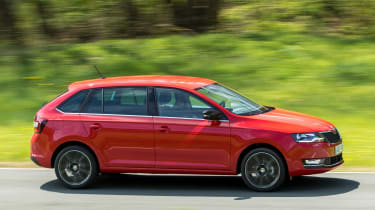Skoda Rapid Spaceback hatchback (2013-2019) - MPG, running costs & CO2
A range of efficient engines makes the Skoda Rapid Spaceback cheap to run
The Rapid Spaceback offers a similar choice of modern, economical petrol and diesel engines as the regular Rapid hatchback, ranging in size from a 1.0-litre petrol in the facelifted model to 1.6 litres (the biggest diesel). None is ruinously expensive to run, and CO2 emissions are low across the range, with every Rapid Spaceback liable for the same £140 annual road-tax bill after the first year’s CO2-based road tax (generally included in the on-the-road price).
We frequently mention that the duration of the VW Group warranty is a bit mean compared to certain rivals, but the durability of the Rapid should mean there aren't too many warranty claims anyway. The servicing schedule is easy to follow and a money-saving service plan is available.
Skoda Rapid Spaceback MPG & CO2
The new-for-2017 1.0-litre three-cylinder petrol engine beats the economy of the previous 1.2-litre. The less powerful version returns up to 62.8mpg with CO2 emissions of 103g/km. The 109bhp version doesn’t harm these figures too much, either: economy falls to 61.4mpg while CO2 emissions climb slightly to 106g/km. This does mean the Benefit-in-Kind (BiK) company-car tax rating is 20% for the more powerful engine, against 19% for the more economical version.
While the petrol engines are impressively economical, a diesel may still make sense if you cover more than 12,000 miles or so a year. There are two to choose from – a 1.4-litre with 89bhp that returns up to 70.6mpg and 105 g/km of CO2 for a 22% BiK rating, and a 109bhp 1.6-litre engine that manages 67.3mpg with no increase in BiK band.
Insurance group
The insurance ratings for the Spaceback range from group 13 for the entry-level S model with the smallest petrol engine, to 17 for the SE Sport with the biggest diesel engine. This is comparable with the Volkswagen Golf and SEAT Leon, but a little higher than the Hyundai i30. However, insurance is unlikely to be prohibitively expensive for any but the highest risk groups.
Warranty
The Spaceback, along with the Rapid hatchback, enjoys Skoda’s three-year warranty, which we can’t help but feel is a little mean compared to that offered by certain rival companies. The Skoda warranty has unlimited mileage for the first two years, but cover in the third year is capped to a maximum of 60,000 miles. This can be extended at the point of sale – stretching the warranty to four years/80,000 miles costs £230, while five years/100,000 miles is £460.
However, Hyundai is generous (or brave) enough to offer a five-year/unlimited-mileage warranty and we think it’s a shame the VW Group can’t match this.
Servicing
The Rapid Spaceback follows the same servicing regime as any other Skoda, allowing you to you manage your car’s maintenance in one of two ways. You can sign up for fixed-interval servicing, where your car receives a service at the end of every year or 10,000 miles; this is recommended for those who cover low mileage or mainly short distances, perhaps primarily in urban areas where the car is subjected to a lot of acceleration and braking. If this sounds like you, it might be wise to look at a service plan – this costs around £279 for the first two services.
Alternatively, if you’re a higher-mileage user you can rely on the engine’s in-built wear sensors. These work to determine when the car needs a service based on how it’s being driven. This may suit you if you primarily use the car for longer journeys, cruising at motorway speeds where the car is subject to little wear. Service intervals can come up at any point between 9,000 and 20,000 miles this way.









